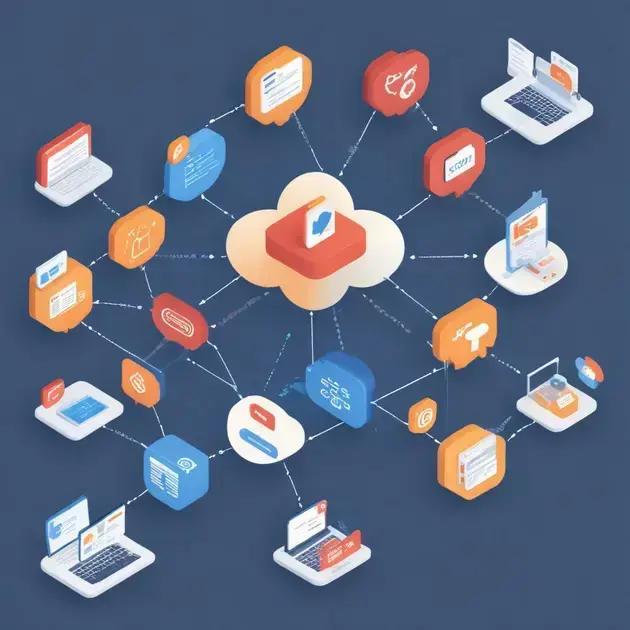Implementing a CRM for ecommerce enhances customer relationships, boosts sales efficiency, and personalizes user experiences. By integrating data management and communication tools, businesses can improve retention and drive growth in a competitive market.
CRM for ecommerce is transforming the way online businesses manage their customer interactions and data. With the rapid growth of ecommerce, having the right tools is crucial. In this article, we will delve into what CRM for ecommerce is, explore its many benefits, and guide you in selecting the perfect solution for your business.
What is CRM for Ecommerce?
CRM for ecommerce refers to Customer Relationship Management systems specifically designed for online retail businesses. These systems help manage customer interactions, sales data, and marketing strategies effectively. With the rise of online shopping, having a solid CRM in place is crucial for understanding customer behavior and enhancing their shopping experience.
Defining CRM
A CRM system collects and organizes customer information, tracks interactions and sales, and helps businesses understand their customers better. For ecommerce, it allows companies to store vital information about their customers, including purchase history, preferences, and communication history.
Features of CRM for Ecommerce
Typical features of a CRM for ecommerce include contact management, sales tracking, customer segmentation, and analytics. These tools enable businesses to analyze customer data to tailor their marketing efforts and improve overall customer satisfaction.
Importance for Online Retailers
In the competitive landscape of online retail, a CRM system helps businesses build lasting relationships with their customers. By providing personalized experiences and targeted marketing campaigns, companies can increase customer loyalty and drive repeat sales.
Moreover, CRM for ecommerce allows businesses to automate various processes, such as sending follow-up emails or running customer retention campaigns, leading to improved efficiency and higher sales.
Understanding what CRM for ecommerce entails is the first step towards its effective implementation. With the right CRM tools in place, ecommerce businesses can significantly enhance their operational capabilities and customer engagement.
Benefits of Using CRM for Ecommerce

Using CRM for ecommerce comes with numerous advantages that can significantly enhance business operations. When online retailers implement a CRM system, they can better manage customer relationships, which leads to improved sales performance and customer satisfaction.
Improved Customer Understanding
One of the primary benefits is the ability to gain insights into customer preferences and behaviors. A CRM allows businesses to track purchase history, interactions, and feedback, enabling them to tailor marketing strategies effectively to meet customer needs.
Enhanced Communication
Effective communication is key to customer retention. CRM systems facilitate timely and personalized communication, whether through automated emails, targeted promotions, or follow-ups. This level of engagement can foster stronger relationships between customers and brands.
Increased Sales Efficiency
By automating routine tasks like data entry and customer outreach, CRM systems free up valuable time for teams to focus on sales strategies and personalized customer interactions. This efficiency can lead to higher conversion rates and increased sales.
Better Customer Retention
A strong CRM system helps businesses understand what makes their customers loyal. With the ability to analyze feedback and track customer satisfaction, businesses can proactively address issues, creating opportunities for higher retention and repeat purchases.
Data-Driven Decision Making
Finally, CRM systems provide detailed analytics and reporting features. Businesses can make informed decisions based on actual data, helping refine their selling strategies and improve target marketing efforts. This data-driven approach can enhance overall business performance.
How to Choose the Right CRM for Your Ecommerce Business
Choosing the right CRM for your ecommerce business is a crucial decision that can significantly impact your operations and customer relationships. Here are some key considerations to help you make an informed choice.
Identify Your Business Needs
Before selecting a CRM, assess what specific needs your ecommerce business has. Determine the features essential for your operations, such as customer segmentation, sales automation, or integration with your business tools. Make a list of priorities to guide your selection.
Evaluate CRM Features
Different CRM systems offer various features. Look for those that provide comprehensive tools for managing customer data, tracking interactions, and analyzing sales performance. Additionally, consider features like mobile accessibility, reporting, and integration capabilities with ecommerce platforms.
Consider User Experience
User-friendly interfaces are vital for ensuring your team can adopt the CRM quickly. A complicated system may hinder productivity, so prioritize CRMs that are easy to navigate. You may want to request a demo or trial to evaluate usability before committing.
Check Integration Compatibility
Your CRM should seamlessly integrate with other systems you are using, such as your ecommerce platform, payment processors, and marketing tools. This compatibility is crucial for escaping data silos and improving overall operational efficiency.
Analyze Cost and Scalability
Lastly, consider your budget and the scalability of the CRM. Choose a solution that fits your current financial constraints but also offers flexibility for future growth. Some CRMs offer tiered pricing models allowing you to add features as your business expands.
Integrating CRM with Ecommerce Platforms

Integrating CRM with ecommerce platforms is crucial for streamlining operations and enhancing customer interactions. This process allows businesses to maintain cohesive data management and improve the overall shopping experience.
Benefits of Integration
When a CRM is integrated with ecommerce platforms, businesses can automatically synchronize customer data and order history. This leads to better customer insights and allows for tailored marketing strategies. Additionally, it can simplify communication between different departments like sales, marketing, and customer service.
Choosing the Right Integration Method
There are several ways to integrate a CRM with your ecommerce platform. This can be done through direct API connections, third-party integration tools, or middleware solutions. Assess the specific requirements of your business and choose the method that suits your operations best.
Steps for Successful Integration
To ensure a successful integration, begin by defining your goals. Outline what data you need to exchange between the systems and establish clear processes for how this data will flow. Testing the integration thoroughly before going live is essential to prevent any disruptions in service.
Monitoring and Adjusting
After integrating, regularly monitor the performance of both systems. Look for any data inconsistencies or operational hiccups that may arise. Being proactive in addressing these issues will help maintain seamless operations and improve customer satisfaction.
Enhancing Customer Experience
Effective integration of CRM and ecommerce platforms can significantly enhance the customer experience. By having access to comprehensive customer data, businesses can provide personalized recommendations, streamline the checkout process, and offer exceptional support, ultimately leading to increased customer loyalty.
Success Stories: CRM Transformations in Ecommerce
Success stories of CRM transformations in ecommerce showcase how businesses have effectively leveraged CRM systems to improve customer relationships and boost sales. Here are some compelling examples.
Case Study 1: Online Fashion Retailer
An online fashion retailer implemented a CRM system to centralize customer data and improve personalized marketing. By analyzing customer purchase history and preferences, the retailer was able to send tailored recommendations and offers. This strategy led to a 30% increase in repeat purchases within six months.
Case Study 2: Electronics E-commerce Platform
A major electronics ecommerce platform faced challenges with customer support. They integrated a powerful CRM with their existing platform to track customer inquiries and complaints more effectively. The result was a significant reduction in response times, which increased customer satisfaction ratings by 40%.
Case Study 3: Health and Beauty Products
A health and beauty business used a CRM system to run targeted email campaigns and manage customer loyalty programs. By analyzing customer behavior, they identified highly engaged customers and created exclusive promotions. This led to a 50% increase in customer loyalty program sign-ups and a notable rise in sales during promotional events.
Case Study 4: Home Goods Retailer
A home goods retailer invested in CRM integration that allowed them to segment their audience based on shopping habits. This strategy enabled them to design specific marketing efforts for different customer groups. Consequently, they experienced a boost in conversion rates by 25%, proving the power of targeted marketing.
Lessons Learned
These success stories illustrate the transformative potential of CRM in ecommerce. Key lessons include the importance of data analysis for personalization, quick response times for customer support, and targeted marketing campaigns. By learning from these examples, other ecommerce businesses can adopt best practices to enhance their customer experiences.
What We Learned About CRM for Ecommerce
Implementing a strong CRM system can dramatically change how ecommerce businesses interact with their customers. From personalizing shopping experiences to speeding up customer service, the benefits are clear.
As we explored various case studies, it’s evident that businesses using CRM effectively saw significant improvements in sales and customer happiness. Choosing the right CRM and integrating it well with your ecommerce platform is critical for these results.
Remember, the right CRM not only helps you manage data but also builds lasting relationships with your customers. By adopting best practices and learning from successful examples, your business can thrive in the competitive ecommerce space.
Don’t miss out on the opportunities a good CRM can bring to your ecommerce business!
FAQ – Frequently Asked Questions About CRM for Ecommerce
What is a CRM system and why is it important for ecommerce?
A CRM system manages customer interactions, helping businesses understand their customers better and improve sales strategies.
How can a CRM enhance customer retention?
By allowing businesses to track customer behaviors and preferences, a CRM helps in personalizing communication and offers, leading to higher customer loyalty.
Are there specific features to look for in a CRM for ecommerce?
Yes, key features include automation of sales processes, customer segmentation, integration with ecommerce platforms, and detailed reporting capabilities.
What are the steps to integrating a CRM with my ecommerce platform?
Identify your business needs, choose the right method for integration, define clear goals, and test the system thoroughly before going live.
Can small businesses benefit from CRM systems?
Absolutely! Small businesses can use CRM systems to manage customer relationships effectively and compete better in the market.
What are some common challenges when implementing a CRM?
Challenges may include data migration issues, user training, and ensuring seamless integration with existing tools and processes.




